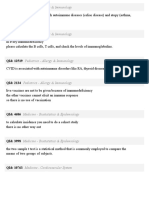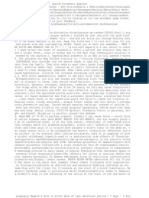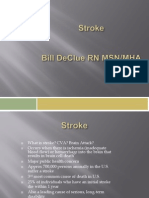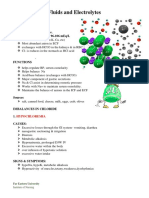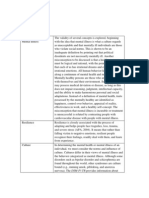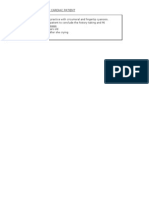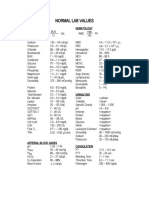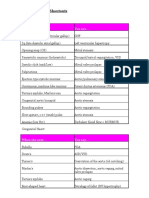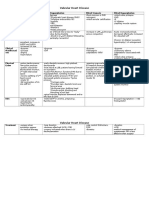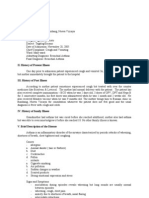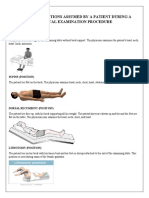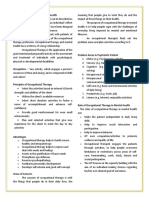Test Taking NLE
Test Taking NLE
Uploaded by
Jayvee AmpoCopyright:
Available Formats
Test Taking NLE
Test Taking NLE
Uploaded by
Jayvee AmpoOriginal Description:
Copyright
Available Formats
Share this document
Did you find this document useful?
Is this content inappropriate?
Copyright:
Available Formats
Test Taking NLE
Test Taking NLE
Uploaded by
Jayvee AmpoCopyright:
Available Formats
Before stepping into the real world of nursing, one must pass their licensure examinations first!
Reviewing board exam questions are just a way of further enhancing your knowledge and confidence for one
of the most important test in your life. What you must remember is that you are already knowledgeable about
cores of nursing, but this knowledge would be futile if you cannot practice effective test-taking skills during
your exams.
Researches suggest that an examiner who fully understands test construction and familiar with appropriate test-
taking strategies score higher than those with similar level of knowledge but with inadequate test-taking skills.
Multiple choice tests are different from tests such as essays, identifications and true/false. In multiple choice
exams, the question is called the stem. The stem is followed by four alternative answers. One answer is
correct, and the other three are called distracter because they distract your attention from identifying the
correct answer. Note also that these distracter are not necessarily incorrect answers but rather they may not be
as correct as as the one you are required to choose.
Here we have 12 effective test-taking skills and strategies that can help you during your examinations:
1. Do not read extra meaning into the question
Tests questions are made to be direct and to the point. The question asks for one particular response and
you should not read or add other information into the question.
Often you will find questions that require common sense answers and that reading into these questions
may give you an other interpretation. You should not search for subtle meaning about the questions or
answers.
Ask yourself What is the question asking?. Look for keywords and phrases to help you understand.
Interpret the question correctly first before reading into the choices.
2. Understand exactly what the stem is asking before considering the distracter
Make sure you read the stem correctly. Notice particularly the way the question is phrase. Is it asking for
the best response or the initial response? Understand what the question is asking.
3. Rephrase the question in your own words
This technique requires you to interpret or translate the question into your own words so that it is very
clear in your own mind. Rephrasing the stem of the question can assist your read the question correctly
and in turn choose the appropriate response.
Placing the question into your own words would help you in removing extraneous data and get into the
core of the stem.
4. When analyzing the distracter, isolate what is important in the answer alternatives from what is not
important relative to the question.
In a good test construction, all of the distracter should be feasible and reasonable and should apply directly
to the stem. There should be a commonality in all of the distracter.
Also, all of the distracter may be correct but not the right chose for the specific question that is being
asked. The technique here is to ask yourself whether each possible alternative is true or false in relation to
the stem.
5. After choosing the correct answer alternative and separating it form the distracter, go back to the
stem and make sure your choice does, in fact, answer the question.
Many test-takers fail to recheck the answer with the stem, and they answer the question incorrectly.
An effective strategy is to judge all four alternative choices against the stem and not against one another.
Read the stem, then check alternative 1 against the stem, then check alternative 2 against the stem and so
on. This process will eliminate choosing an alternative that does not fit with the question.
6. When a question contains multiple variables as alternative choices, use the elimination of variable
technique.
Each question may pose different alternatives with several variables. Use the process of elimination. Study
the question first and ask yourself what variable fits with this condition, or after examining the distracter
underline the symptom that you know is correct. Now ask yourself what variable is not present with this
condition. Again examine the distracter and cross out those variables that are incorrect. By this process
your probably eliminated at least two distracter even without taking the time to consider the other two.
7. When answering a difficult question, utilize your body of knowledge.
When you come across a difficult question and you cannot immediately identify the answer, go back to
your body of knowledge and draw all the information that you do know about the condition.
If you are unfamiliar with the disease or disorder and cannot choose the right nursing action, try to
generalize to other situations. For example, if the question asks about dog bites, and youve never learned
the course of the disorder, go back to an area of k nowledge that you do know, for example, circulation
and body response to toxic substances.
Even though you do not know exactly what to d, you might know what not to do. Eliminate distracter to
increase your chances of arriving at the correct answer.
8. The ability to guess correctly is both a skill and an art.
The board exams is not a right minus wrong type. It is important for you to answer every question even
if you have to guess. Guessing gives you only a 25% chance of getting the correct answer.
Try to eliminate at least one (or more) distracter as this will increase the percentage margin of chance for
guessing correctly.
Examine the distracter and if one is the exact opposite of another (e.g. complete bed rest is different from
activity as tolerated; both cannot be correct since they are of opposites), choose the one that seems to be
most logical.
Try to identify the underlying principle that supports the question. If you can answer the question, you
might then be able to guess the correct answer. This strategy is especially true with a psychosocial
question.
Look at the way the alternatives are presented. Are there two answers that are very close? often when this
occurs, the ability to discriminate will show evidence of judgement. Check to see if one, more than the
other, is the best choice for the question.
Are there distracter that are presented not logical (which are correct in themselves but do not have
anything to do with the question)? Eliminate these and focus on other alternatives.
Use your intuition. If you cannot choose an alternative from a logical point, allow yourself to feel which
one might be right. Often your subconscious mind will choose correctly (based on all the conscious
knowledge you have of course) so simply let yourself feel which alternative might be right. Remember, its
better to choose one answer than none at all.
9. Choosing answer from a hunch
There comes a time when you are faced with a certain question and you have a hunch that this particular
choice is correct. Do we depend on this hunch?. Current studies supports that hunches are often correct,
for they are based on rapid subconscious connections in the brain.
Your stored knowledge, recall, and experience can combine to assist you in arriving at the correct answer.
So, if you have an initial hunch, go with it! Do not chance the answer if and only if, upon reflection, it just
doesnt seem right. On the other hand, if later in the test you find relevant information or make new
connection of information and you feel that your answer was incorrect, do go back and change it.
10. Choosing the best answer from a strategy point-of-view.
Frequently, the most comprehensive answer is the best choice (Longest the best!). For example, if two
alternatives seems reasonable but one answer includes the other (i.e., it is more detailed, more
comprehensive), then this answer would be the best choice. If an answer focuses on medical knowledge,
be wary, for this alternative might be just a good distractor. Remember, this is a nursing test and questions
are designed to test your nursing competency and safety.
It is unlikely that a question would require a medical action for the correct answer; it may, however offer
these actions as distracter.
Beware of answers that contain specific qualifiers, such as always and never. they rarely fit within a
logical framework.
11. Time Management is important
Time allotment for each question in the NLE is 2 hours/100 questions is equal to 1.2 minutes. It is
important to use your time wisely and program yourself not to spend too much time on one question.
Since your are not penalized for incorrect answers, it is important to finish each portion of the test.
Prepare yourself to practice time management by timing yourself for each question during your sample
exams.
12. Let the Divine Intervention Intervene
If you cannot answer the question. Have faith in the Lord and thus youll be confident to answer each
question. If you do not know, He knows. Ask for Gods help! Remember, you are doing this for His glory!
Reference:
Smith S. (1989). Review questions for NCLEX-RN 5th Edition.
You might also like
- Benchmark Test - Question Types WalkthroughDocument40 pagesBenchmark Test - Question Types Walkthroughacademia de ingles del norte100% (1)
- Cardiomyopathy Concept MapDocument2 pagesCardiomyopathy Concept Mapfriendofnurse100% (1)
- FC Paed (SA) Guidelines For Candidates 6-4-2014Document4 pagesFC Paed (SA) Guidelines For Candidates 6-4-2014matentenNo ratings yet
- Discussion QuestionsDocument2 pagesDiscussion QuestionsMary RiasNo ratings yet
- Bhs InggrisDocument21 pagesBhs InggrisShelia Desri WulandariNo ratings yet
- Child CounsellingDocument37 pagesChild Counsellingamala sud67% (3)
- Nle 28 June AnswerDocument11 pagesNle 28 June AnswermahedNo ratings yet
- Grand Rounds - Pulmonary EmbolismDocument25 pagesGrand Rounds - Pulmonary EmbolismAdrian CastroNo ratings yet
- U World Endocrine FinalDocument12 pagesU World Endocrine Finalsean blazeNo ratings yet
- 2015 Step2CK SampleItemsDocument40 pages2015 Step2CK SampleItemspreethamNo ratings yet
- Endocrine Med-Surg Slide Show Presentation (Nursing)Document43 pagesEndocrine Med-Surg Slide Show Presentation (Nursing)loveoverprideNo ratings yet
- Hematology Oncology Notes Syrian StudentDocument2 pagesHematology Oncology Notes Syrian StudentLoyla RoseNo ratings yet
- Fluids and ElectrolytesDocument78 pagesFluids and ElectrolytesSoleil DaddouNo ratings yet
- History and Physical ExaminationDocument17 pagesHistory and Physical ExaminationNur Fatima SanaaniNo ratings yet
- UntitledDocument41 pagesUntitledvioletdeocaresNo ratings yet
- Endocrinology, Diabetes, and Metabolism - American Board of Internal Medicine - ABIMDocument3 pagesEndocrinology, Diabetes, and Metabolism - American Board of Internal Medicine - ABIMabimorgNo ratings yet
- Patient Education ToolkitDocument15 pagesPatient Education ToolkitI Nyoman Gede SemarajanaNo ratings yet
- Ventilator Associated PneumoniaDocument2 pagesVentilator Associated PneumoniaMuzana DariseNo ratings yet
- Impactednurse Nurses Reference PackDocument2 pagesImpactednurse Nurses Reference PackRaenell CurryNo ratings yet
- Medical Case 1: Language Centre of Malahayati University at 2010Document16 pagesMedical Case 1: Language Centre of Malahayati University at 2010putri1114No ratings yet
- Acute GastroenteritisDocument27 pagesAcute GastroenteritisEvelyn MedinaNo ratings yet
- Alarm Symptoms of Hematoonco in Pediatrics: Dr. Cece Alfalah, M.Biomed, Sp.A (K) Pediatric Hematology and OncologyDocument22 pagesAlarm Symptoms of Hematoonco in Pediatrics: Dr. Cece Alfalah, M.Biomed, Sp.A (K) Pediatric Hematology and OncologyMuhammad ArifNo ratings yet
- EclampsiaDocument56 pagesEclampsiagalihtrimuninggarNo ratings yet
- Nursing Review Bullets HighlightsDocument65 pagesNursing Review Bullets HighlightsEuanne OrellanoNo ratings yet
- A Case of BreathlessnessDocument5 pagesA Case of BreathlessnesschuhuaNo ratings yet
- Hepatic EncephalopathyDocument16 pagesHepatic EncephalopathyChenyuZhu100% (1)
- USPSTF RecommendationsDocument3 pagesUSPSTF RecommendationsKevinMathewNo ratings yet
- MELD Related Files Liver MELD-PlusDocument45 pagesMELD Related Files Liver MELD-PlusUKNo ratings yet
- Chapter - 058 - Stroke Elseivier Powerpoint For My Class LectureDocument52 pagesChapter - 058 - Stroke Elseivier Powerpoint For My Class LectureSuraj Mukatira100% (2)
- 3.1 Hypochloremia & HyperchloremiaDocument3 pages3.1 Hypochloremia & HyperchloremiaBooz Waief CaluzaNo ratings yet
- Vacarolis Chapter OutlinesDocument181 pagesVacarolis Chapter Outlinesamashriqi100% (1)
- Medad How To Write An OBGYN SheetDocument47 pagesMedad How To Write An OBGYN SheethemazzzzNo ratings yet
- Preoperative AssessmentDocument2 pagesPreoperative AssessmentTom MallinsonNo ratings yet
- History Taking in Pediatric Cardiac PatientDocument2 pagesHistory Taking in Pediatric Cardiac PatientsyududNo ratings yet
- Normal Lab ValuesDocument1 pageNormal Lab Valueshurt_y100% (1)
- Cardiovascular Shoutouts: When She Says You SayDocument7 pagesCardiovascular Shoutouts: When She Says You SayGbotemi AlaladeNo ratings yet
- History Taking in PaediatricsDocument3 pagesHistory Taking in PaediatricsHajar Hanis SofiaNo ratings yet
- Med Surg Exam 3 Comprehensive Review of The Material Covered For Professor Martinez Medical PDFDocument53 pagesMed Surg Exam 3 Comprehensive Review of The Material Covered For Professor Martinez Medical PDFBirhanu Ayenew100% (1)
- Hirschprung's Disease, Celiac Disease, Hydrocephalus, Poisoning, Child Abuse, Anemia, Respiratory DisordersDocument139 pagesHirschprung's Disease, Celiac Disease, Hydrocephalus, Poisoning, Child Abuse, Anemia, Respiratory DisordersJhoms Poja FeriaNo ratings yet
- Valvular Heart Disease: Aortic Stenosis Aortic Regurgitation Mitral Stenosis Mitral Regurgitation Common EtiologiesDocument2 pagesValvular Heart Disease: Aortic Stenosis Aortic Regurgitation Mitral Stenosis Mitral Regurgitation Common Etiologiesanisal489No ratings yet
- Medical Surgical Nursing Exams BoardDocument36 pagesMedical Surgical Nursing Exams BoardCINDY� BELMESNo ratings yet
- Asthma2 Case StudyDocument8 pagesAsthma2 Case StudyGlenn Asuncion PagaduanNo ratings yet
- Morning Report: Sarah Todd, PGY-3 August 7, 2015Document19 pagesMorning Report: Sarah Todd, PGY-3 August 7, 2015Emily EresumaNo ratings yet
- Med-Surge Study GuideDocument39 pagesMed-Surge Study Guidefbernis1480_11022046No ratings yet
- Ethic ScenariosDocument28 pagesEthic ScenariosQusaiBadrNo ratings yet
- Developmental MilestonesDocument1 pageDevelopmental MilestonesStephen BryanNo ratings yet
- Medical History Outline-2020Document9 pagesMedical History Outline-2020sumiti_kumarNo ratings yet
- Acute Respiratory Failure: Part 1. Failure in OxygenationDocument6 pagesAcute Respiratory Failure: Part 1. Failure in OxygenationnytenurseNo ratings yet
- Oral Revalida Im Cases Dec. 12 and 13 2020Document16 pagesOral Revalida Im Cases Dec. 12 and 13 2020Bea Y. Bas-ongNo ratings yet
- Behavior and Ethics QuestionsDocument26 pagesBehavior and Ethics QuestionsRahul VadlapatlaNo ratings yet
- 3M CVP Monitoring - Assisting in BMA ECG Interpretation - Final Draft - 3CDocument65 pages3M CVP Monitoring - Assisting in BMA ECG Interpretation - Final Draft - 3CAlexa GoteraNo ratings yet
- Clinical CasesDocument12 pagesClinical CasesAndreea HanuNo ratings yet
- Cardiovascular Case Study Jan 2 101xDocument4 pagesCardiovascular Case Study Jan 2 101xElizabeth SpokoinyNo ratings yet
- CnsDocument15 pagesCnsArun GeorgeNo ratings yet
- Different Positions Assumed by A Patient During A Physical Examination ProcedureDocument14 pagesDifferent Positions Assumed by A Patient During A Physical Examination ProcedureAziil LiizaNo ratings yet
- UWorld Cards July 14Document7 pagesUWorld Cards July 14smian08No ratings yet
- Ventricular Septal Defect, A Simple Guide To The Condition, Treatment And Related ConditionsFrom EverandVentricular Septal Defect, A Simple Guide To The Condition, Treatment And Related ConditionsNo ratings yet
- A Simple Guide to Hypovolemia, Diagnosis, Treatment and Related ConditionsFrom EverandA Simple Guide to Hypovolemia, Diagnosis, Treatment and Related ConditionsNo ratings yet
- Leaping the Hurdles: The Essential Companion Guide for International Medical Graduates on their Australian JourneyFrom EverandLeaping the Hurdles: The Essential Companion Guide for International Medical Graduates on their Australian JourneyNo ratings yet
- A Simple Guide to Thyrotoxicosis, Diagnosis, Treatment and Related ConditionsFrom EverandA Simple Guide to Thyrotoxicosis, Diagnosis, Treatment and Related ConditionsNo ratings yet
- Working with Children Who Need Long-term Respiratory SupportFrom EverandWorking with Children Who Need Long-term Respiratory SupportNo ratings yet
- Appendix 2: MCT/MST Lesson Observation Feedback Form TemplateDocument8 pagesAppendix 2: MCT/MST Lesson Observation Feedback Form Templatemahra albloushiNo ratings yet
- Alternative AssessmentDocument16 pagesAlternative AssessmentHarold JohnNo ratings yet
- Consolidation 1 & Unit 1 - Reading and Listening Strategies PDFDocument10 pagesConsolidation 1 & Unit 1 - Reading and Listening Strategies PDFDaniel TimişNo ratings yet
- Competency Mapping: By: Manisha PatilDocument35 pagesCompetency Mapping: By: Manisha PatilManishaNo ratings yet
- Perdev Lesson 2Document43 pagesPerdev Lesson 2D GarciaNo ratings yet
- Career Planning NotesDocument6 pagesCareer Planning NotessreeyaNo ratings yet
- The+Model+of+Creative+AbilityDocument22 pagesThe+Model+of+Creative+AbilitysandeepNo ratings yet
- Frias Module 3a OutputDocument15 pagesFrias Module 3a OutputRafaela VillanuevaNo ratings yet
- Lesson Plan: Name/NIM: Rikardus JehadunDocument3 pagesLesson Plan: Name/NIM: Rikardus Jehadunrikar jehadunNo ratings yet
- My Classroom Management Plan: Philosophical StatementDocument5 pagesMy Classroom Management Plan: Philosophical Statementraziel yuragNo ratings yet
- Sample 1 - Slide Presentation - Performance Based Pay ArticleDocument5 pagesSample 1 - Slide Presentation - Performance Based Pay ArticleNeach GaoilNo ratings yet
- Paired ReadingDocument2 pagesPaired Readingapi-279525826No ratings yet
- Impact of Flexible Working Hours On Work-Life Balance: Sussanna Shagvaliyeva, Rashad YazdanifardDocument4 pagesImpact of Flexible Working Hours On Work-Life Balance: Sussanna Shagvaliyeva, Rashad YazdanifardNurul IzzatyNo ratings yet
- "Business Plan" Massage Business (Swot Analysis)Document1 page"Business Plan" Massage Business (Swot Analysis)EunHaeFallado-RyongNo ratings yet
- Rle AssDocument5 pagesRle AssMikaCasimiroBalunanNo ratings yet
- Dissociative Identity DisorderDocument4 pagesDissociative Identity DisorderRichieDaisy100% (2)
- Microteach Reflection TemplateDocument2 pagesMicroteach Reflection Templateapi-237193640100% (1)
- Resume - OutlineDocument2 pagesResume - OutlineVaughn BantonNo ratings yet
- Job Satisfaction Questionnaire PDFDocument3 pagesJob Satisfaction Questionnaire PDFShibu ThakurNo ratings yet
- Leading and Leadership DevelopmentDocument0 pagesLeading and Leadership DevelopmentSyed Ahmed AliNo ratings yet
- G4 Jupiter English Class Reading Profile SummaryDocument5 pagesG4 Jupiter English Class Reading Profile SummaryMichelle Jane Galicia DaquizNo ratings yet
- English For Specific Purposes (ESP) : Stephen Van Vlack Sookmyung Women S University Graduate School of TESOLDocument11 pagesEnglish For Specific Purposes (ESP) : Stephen Van Vlack Sookmyung Women S University Graduate School of TESOLNovianti ArifNo ratings yet
- MBA - Unit 1 - MB20107 - Managerial Skills and CommunicationDocument21 pagesMBA - Unit 1 - MB20107 - Managerial Skills and CommunicationBalaji DNo ratings yet
- Tell Me A Little About YourselfDocument5 pagesTell Me A Little About YourselfsimoneNo ratings yet
- Stages of Psychotherapy Process: Zsolt UnokaDocument15 pagesStages of Psychotherapy Process: Zsolt UnokaNeil Retiza AbayNo ratings yet
- Job AnalysisDocument24 pagesJob AnalysisShalini JaiswalNo ratings yet
- Cpe Proficiency Gold Word ListsDocument3 pagesCpe Proficiency Gold Word Listslonglongfru100% (2)










